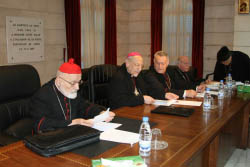 By Maroun Khoury and Nafez Qawas, BKIRKI: The Council of Maronite Bishops called on Wednesday for the immediate implementation of the Arab initiative to solve the deadlock in Lebanon, while sounding the alarm concerning "strenuous" economic conditions faced by the Lebanese. The Maronite bishops said it was unfortunate that a Lebanese president was not able to participate in the recent Arab summit, especially after the Arab League had stressed the need to elect a president in Lebanon. "We call for internal and external cooperation to implement the Arab initiative to solve Lebanon's crisis," the bishops said after their monthly meeting in Bkirki.
By Maroun Khoury and Nafez Qawas, BKIRKI: The Council of Maronite Bishops called on Wednesday for the immediate implementation of the Arab initiative to solve the deadlock in Lebanon, while sounding the alarm concerning "strenuous" economic conditions faced by the Lebanese. The Maronite bishops said it was unfortunate that a Lebanese president was not able to participate in the recent Arab summit, especially after the Arab League had stressed the need to elect a president in Lebanon. "We call for internal and external cooperation to implement the Arab initiative to solve Lebanon's crisis," the bishops said after their monthly meeting in Bkirki. The three-point Arab initiative calls for the election of the commander of the Lebanese Armed Forces, General Michel Suleiman, as a consensus president, the formation of a national unity government and the drafting of a fair and representative electoral law. "The situation in Lebanon is preventing the country from recovering on the economic level, and this pushes economic sectors and the working class to complain of declining living conditions and to threaten strikes," the bishops said.
"The present situation could damage summertime tourism. This requires the government to take steps to facilitate the arrival of tourists to Lebanon," they added. The Maronite bishops said that the government must deal with the problems regarding the standard of living "in a responsible manner."
They also said that some citizens in the Bekaa region have been complaining that some of their land and water has been taken over.
"We call on the government to take the necessary measures and to treat everyone with fairness," the statement added.
Echoing demands voiced by the Maronite Bishops, the Council of Muftis in Lebanon, under the chairmanship of Grand Mufti Sheikh Mohammad Rashid Qabbani, issued a statement on Wednesday warning about the risks of perpetuating the presidential vacuum. Lebanon has not had a president since Emile Lahoud stepped down in November.
"In view of the council's commitment to general national causes and concern for citizens and the fate of the nation," the statement read, the council called for the election of the LAF commander as a consensus candidate as the first step in an initiative "which would reactivate parliamentary life." The council also called for the formation of a national unity government "which would in turn agree on a new parliamentary electoral law that would achieve justice and reflecte the honest will of the Lebanese people."
The statement called for an end to the opposition sit-in in the Beirut Central District, saying it had led to "the paralysis of economic life in the heart of the capital Beirut."
The Hizbullah-led opposition has been staging a sit-in in downtown Beirut since December 2006 to demand more say in government decisions.
The council discussed the recent Arab summit held in Damascus and Lebanon's decision to boycott the meetings for the first time in the history of Arab summits. "Lebanon's absence from the summit works as a political statement rejecting the presidential vacuum and confirming the Taif Accord as a basis of the nation," the muftis said.
They invited all Arab states to work for the implementation of their "constructive reconciliatory initiative in Lebanon."